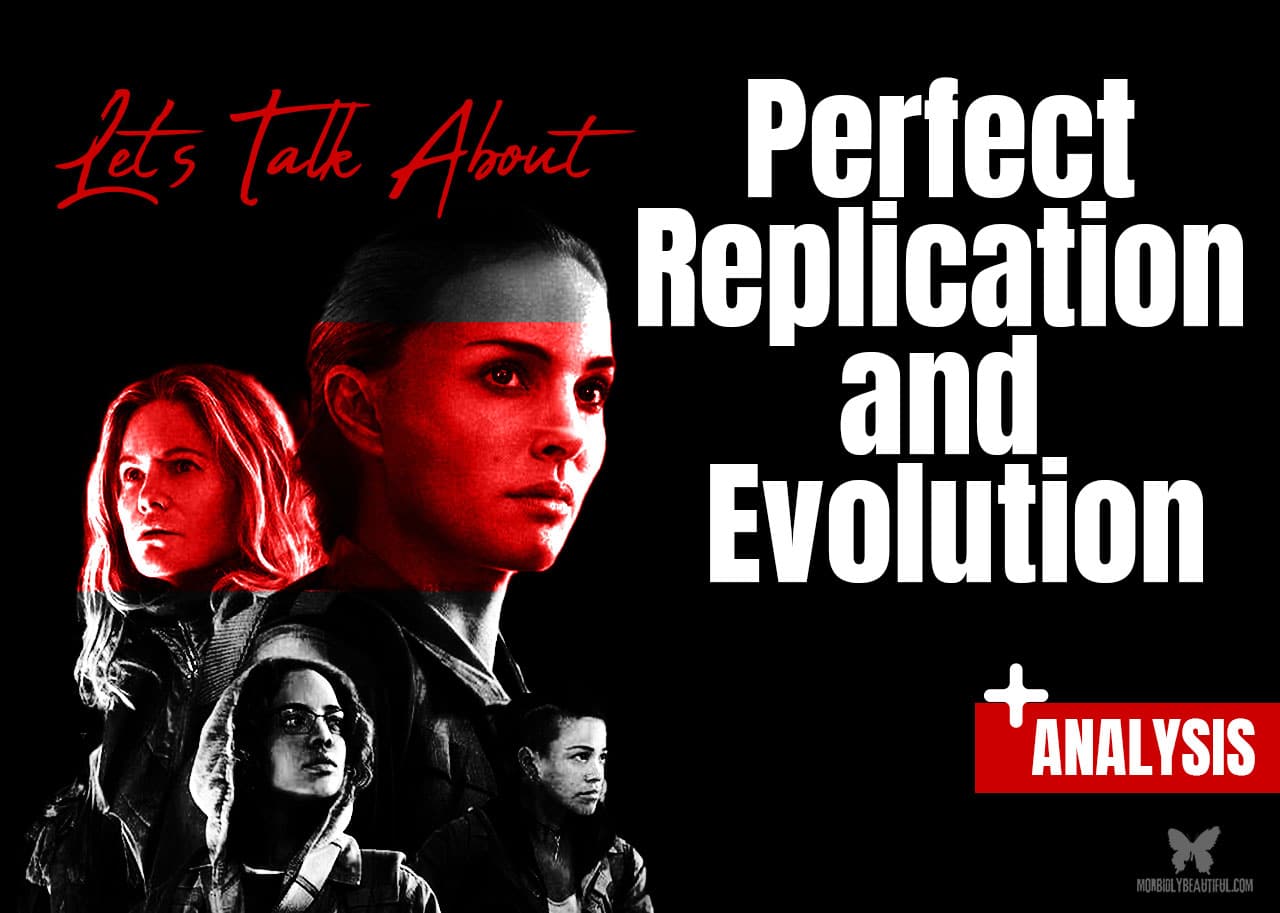In the face of annihilation, two films ask what it means to be human — magnificent but monstrous — are we destined or doomed?
When the human race is confronted with a growing alien terror that consumes and makes more of itself, there will be similar themes. Two films, Annihilation and Significant Other, came out within a few years of each other and attempted to examine our humanity in the face of that which seeks to destroy, exploit, or manipulate it.
In the Southern Reach, a comet crash-landed in a lighthouse as the plot for Annihilation. A “red star” in the Pacific Northwest fell in a cave in Significant Other. It landed, is here, and has begun extending to breach our world at the cellular level.
Annihilation (2018) revolves around the Shimmer (also known as Area X), something that has been steadily growing in size since crash-landing on Earth. It changes things inside of it.
No one comes back out except for Sergeant Kane (Oscar Isaac), who briefly returns to his wife, Lena (Natalie Portman), before his organs start to fail. She is a preeminent biologist who was once in the Army. After discovering Area X, Lena joins an expedition inside — led by psychologist Dr. Ventress (Jennifer Jason Leigh) — to see if she can save her husband, armed with new knowledge of the Shimmer.
In Significant Other (2022), a woman, Ruth (Maika Monroe, It Follows), is trapped by an alien lifeform that has anthropomorphized into her boyfriend, Harry’s (Jake Lacy) form and subsequently develops feelings for her. This stops it from killing her because her boyfriend loved her (the original boyfriend was murdered). She would be dead, too, if the alien hadn’t assumed her boyfriend’s DNA.
The alien tries to convince Ruth to return to where he’s from with him because more of them are coming, and it won’t be good for humanity.
There’s always a level of artistry in such movies, showing us gorgeous yet threatening images, usually within nature.
Nature, in itself, is somewhat threatening while also being breathtakingly beautiful; we fear it on some level.
Nature neither welcomes nor shuns with purpose, but it can easily kill us. It can also provide shelter, so it is completely neutral regarding true evil, which at its core means unfriendly to humans.
Another question arises: Could the annihilation of our species ever be beautiful? Is death natural? We all come from single cells that multiply. Yet, so does cancer.
There is such symmetry in the natural world that the human molecular structure mimics. I’ve noticed it personally with eyeball veins (I worked in an optometrist’s office) looking like stars in the night sky, placenta resembling trees, and tree rings looking like fingerprints; as above, so below. Annihilation ran with that idea to bring us disturbing creations of prismatic refractions of all DNA in all that exists.
At the cellular level, the Significant Other aliens were us, so they were subject to our foibles, anxieties, and stresses.
In Annihilation, the alien’s cellular code overwrote ours until we were a part of it, a kind of possession but not evil in its intentions. Inside the Shimmer or even near it, humans fall asleep and awaken in the fetal position, which was our form in the womb as we grew in utero. This reduces us to the cellular beginning. We start at one cell, then two.
If aliens can mimic our core human emotions, even if they cannot genuinely feel those emotions themselves, it gets to the ultimate question: what makes us human?
To me, these movies are about evolutionary beginnings and the rejection and acceptance of possible oncoming evolution.
They are also about destruction.
In Significant Other, Kane’s body dies from multiple organ failure as he is reborn as a child of Area X. To create, sometimes we must first destroy. Having both made it out with the original cellular structure destroyed but infected with the Shimmer (Kane is remade, Lena is infected), Lena and Kane venture into the world as something new; they are the new evolution of the human species.
Yet, this invasion is not about making something new. It’s about assimilating us and making our world theirs (consciously or not, it’s a coup).
If anything, these extraterrestrials probably see it as them making our world better. Honestly, why shouldn’t they? People can be deeply destructive, especially towards the environment.
Two deer appear in Annihilation; one looks ruined, a possible remnant of our world as it strips the imperfection of earthly cells away from it. Now, it is moving in unison with the beautiful replica that the Shimmer refracted from it.
The major difference in these movies is that the alien lifeform in Annihilation does not seem to have sentience (though it is capable of complete replication, fractals, and infection just by being near it).
The life forms in Significant Other are aware, and they’re coming to take over the human world. It cannot be escaped or seemingly destroyed. “Unfathomable mind” is what Dr. Ventress tells us as she’s absorbed into it. But perhaps it’s not a mind at all but merely a symbiosis of cells using our minds to think — a cellular mimicry of our thinking minds.
For Ventress, the possibility of her own death via cancer changes the way she views the possible catastrophe of our world because she is presented with the possibility of being somehow saved by this new Thing.
In Significant Other, we have a takeover from beings that do not understand the complications of being human; in that way, we might defeat them since, essentially, we are fighting ourselves.
This joins with what Annihilation is saying: eventually, it becomes us, and we fight their version of us.
Can we fight ourselves? In a way, we all do, but when new beings enter the equation, it’s an entirely different kind of fight for dominance. Cellularly, they are us, but they do not understand trickery or even emotion. Does this make us more or less inclined to win the battle?
Our efforts to control our own worst tendencies as humans have not proven especially fruitful. Could we rise to the occasion if the threat was more immediate than existential, more external than internal?
The infamous “bear” creature in Annihilation is horrifying because it mimics a human’s dying words and screams in its roar. It’s the echo of humanity made monstrous that is so chilling.
Lena’s confrontation with the true nature of the Shimmer through Ventress in a womb-like room or cave makes utter sense.
Human life begins in a womb, and it makes sense that human life as we know it would end in a womb (with something different being born into our world).
Lena is able to find the source and cut off the cellular evolution via grenade, which ends the Shimmer since it all grew from that singular cell and hive-like, ended when that beginning cell died. It echoes our own human journey, with all life beginning from a single cell and evolving to the level of complexity and adaptability we have today.
Significant Other does not end quite so optimistically; extraterrestrials are coming — and rapidly. It leaves us with the open ending of the aliens coming while Ruth gets as far away as possible. It probably won’t save her to put distance between them, but there’s always hope that humanity will endure.
As for us watching movies like these and contemplating our existence and possible annihilation, we realize that our extinction likely won’t come from another planet. Most likely, our demise will be the result of our own doing.
Perhaps, however, our humanity will save us in the end — from any potential external threat and, most importantly, from ourselves.



















Follow Us!